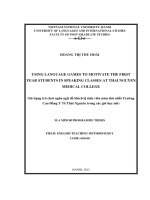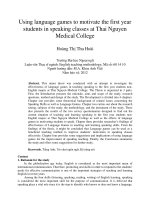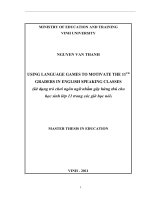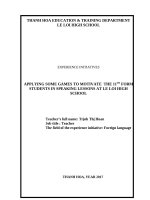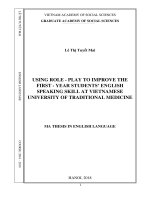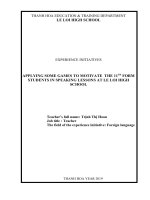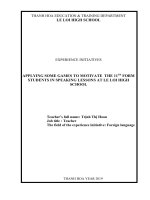Using language games to motivate the first year students in speaking classes at Thai Nguyen Medical College
Bạn đang xem bản rút gọn của tài liệu. Xem và tải ngay bản đầy đủ của tài liệu tại đây (187.53 KB, 4 trang )
Using language games to motivate the first year
students in speaking classes at Thai Nguyen
Medical College
Hoàng Thị Thu Hoài
Trường Đại học Ngoại ngữ
Luận văn Thạc sĩ ngành: English teaching methodology; Mã số: 60 14 10
Người hướng dẫn: M.A. Khoa Anh Việt
Năm bảo vệ: 2012
Abstract. This minor thesis was conducted with an attempt to investigate the
effectiveness of language games in teaching speaking to the first year students non-
English majors at Thai Nguyen Medical College. The Thesis is organized in 3 parts:
First, the Introduction presents the rationale, aims and scope of the study, research
questions, method and design of the study. The Development is divided into 4 chapters:
Chapter one provides some theoretical background of related issues concerning the
Speaking Skills as well as Language Games. Chapter two carries out about the research
setting, subjects of the study, the methodology, and the instrument of the study. There
also presents the results of the two survey questionnaires designed to find out the
current situation of teaching and learning speaking to the first year students non-
English majors at Thai Nguyen Medical College as well as the effects of language
games in motivating students to speak. Chapter three provides researcher’s findings of
effectiveness of Language Games in teaching and learning speaking skills. From the
findings of the thesis, it might be concluded that Language games can be used as a
beneficial teaching method to improve students’ motivation in speaking classes
effectively. Chapter four provides some suggestions and implications of using language
games for the improvement of speaking teaching. Finally, the Conclusion summaries
the study and offers some suggestions for further study.
Keywords. Tiếng Anh; Trò chơi ngôn ngữ; Kỹ năng nói
Content
1. Rationale for the study
In the globalization age today, English is considered as the most important mean of
international communication. Therefore, promoting oral skills in order to respond to the students’
needs for effective communication is one of the important strategies of teaching and learning
English in recent years.
Among the four skills (listening, speaking, reading, writing) of English learning, speaking
is considered the most important skill for the purpose of communication. It is believed that
speaking plays a vital role since it is the step to identify who knows or does not know a language.
Pattison (1992) confirms that when people know or learn a language, they mean being able to
speak the language. Similarly, Ur, (1996) shows that people who know a language are referred to
as “speakers” of that language as if speaking included all other kinds of knowing. However,
teaching and learning speaking today does not meet the study objectives. English teaching now
in general and teaching speaking in particular is still far from satisfactory. Although teachers
have made great efforts to provide students with chances to improve their speaking skills, how to
teach and learn speaking effectively is still a challenging question to both teachers and students
at many colleges and universities.
At Thai Nguyen Medical College (TMC), all students are non- English majors who
specialize in many different fields such as Nursing, Pharmacy, Midwifery, etc. Most students
find speaking especially important yet most challenging one. For most of them, it is difficult to
speak English naturally. As a result, in speaking lessons, they often feel bored and frightened.
How to motivate and encourage students to speak is really necessary, and is a big question to
almost teachers. Also, teaching techniques exploited during a speaking activity, for example, role
plays, simulations, discussions, etc. do not bring much effectiveness. Thus, it is necessary to find
an effective technique used in teaching speaking. Moreover, in language teaching, language
games have proved themselves as an important factor which can create more chances and interest
to motivate students to speak. Language games not only banish boredom, provide learners with
enjoyable environment but also supply them with chance to use language and constitute a bridge
between the lesson and the real world (Greenal, 1984)
For all the reasons mentioned above I have decided to choose the topic “Using language
games to motivate the first year students in speaking classes at Thai Nguyen Medical College”
for my minor thesis with the hope that it might be helpful to both teachers and students in
teaching and learning speaking.
2. Aims of the study
The study is carried out in order to:
Investigate the current situation of teaching and learning speaking to the first year
students who are non-major English students at Thai Nguyen Medical College.
Explore the effects of language games in teaching speaking to the first year students who
are non-major English students at Thai Nguyen Medical College.
Provide some suggestions and implications of using language games for the improvement
of speaking teaching at Thai Nguyen Medical College.
3. Research questions
The research is to seek answer to the following questions:
What is speaking teaching and learning reality to the first year non- major English
students at Thai Nguyen Medical College?
How can language games help to improve students’ motivation in speaking classes?
What are the suggestions and implications of using language games in speaking lessons?
4. Scope of the study
For the limitation of time, conditions, and materials, in this minor study, the researcher
focuses specifically on the use of language games in teaching speaking to the first year student’s
non - English majors at TMC. So the study limits itself to the teaching and learning speaking
only, and the subjects of the study are 90 nursing students from two classes studying new
“Headway” course book at Thai Nguyen Medical College.
5. Research methods
In order to realize the aims of the study, quantitative method is used. The survey
questionnaire is used to collect information and evidence for the study. The survey questionnaire
including pre-task survey questionnaire and post task survey questionnaire is for 90 first year
students non - English majors from two classes of Thai Nguyen Medical College, both specialize
in Nursing. All comments, remarks and recommendations given in the study are based on the
data analysis.
6. Organization of the study
This minor thesis is composed of three parts as follow:
Part A -INTRODUCTION. In this part, the rationale, the aims, research questions,
as well as scope of the study, methods of the study and also its design are presented.
Part B – DEVELOPMENT. This part includes 4 chapters.
Chapter 1 deals with some theoretical background that is relevant to the purpose of the
study: speaking skill and language games.
Chapter 2 investigates the situation of teaching and learning speaking and the feasibility
of using language games in teaching speaking to the first year students non- English
majors through the analysis of collected data.
Chapter 3 consists of some findings concluded from the data analysis.
Chapter 4 provides some suggestions on using language games as well as some sample
language games exploited during all stages of speaking lessons.
Part C – CONCLUSION. In this part, the summary of the study, limitations of the study and
suggestions for further study are mentioned
REFERENCES and APPENDICES are presented in the last pages of the study.
References
1. Brown, H. D. (1994b). Teaching by Principles – An Interactive Approach to Language
Pedagogy. USA: Prentice Hall Regents.
2. Byrne, D. (1995). Games: Teaching Oral English. Harlow: Longman Group UK Limited
3. Byrne, D. (1978). Teaching Oral English. Longman. London.
4. Bygate, M. (1997). Speaking. Oxford: Oxford University Press.
5. Carrier, M (1980). Games and Activities for the Language Learners. UK: Thomas Nelson
and Sons
6. Carrier, M (1985). Take 5 games and activities for the language leaning. UK: Thomas
Nelson and Sons.
7. Chamberlain, A. (1981). Language games: A challenge to the Teacher’s Creative
Imagination. Singapore: RELC.
8. Chaney, A.L. and Burk, T.L. (1998). Teaching Oral Communication in Grades K-8.
Boston: Allyn&Bacon.
9. Crookes. G & Schmidt R.W. (1991). Motivation: Reopening the research agenda.
Language learning, 41 (4), 469-512.
10. David, K. & Hollowell, J. (1989). Inventing and playing games in the English classroom.
Oxford: Oxford University Press.
11. Dornyei, Z. (2001). Motivational strategies in the Language Classroom. Cambridge
University Press.
12. Gardner, RC. (1985). Social Psychology and second language learning: The roles of
attitudes and motivation. London: Edward Arnold.
13. Gibbs, G. (1987). Dictionary of gaming, Modeling and Stimulation. E & FN Spon Ltd.,
London.
14. Greenal, S. (1984). Language games and activities. Great Britain: Hulton Educational
Publication.
15. Hadfield, J. (1987). Elementary Communication Games. UK: Thomas Nelson and Sons.
16. Hadfield, J. (1990). A collection of Games and Activities for Low to Mid-intermediate
students Of English. Intermediate Communication Games. Hong Kong: Thomas Nelson
and Sons Ltd.
17. Hashimoto, Y. (1997). Motivation and Willingness to Communicate as Predictors of
Reported L2 Use: The Japanese ESL Context. University of Hawaii.
18. Hornby, A.S. (2005). The Oxford Advanced Learner's Dictionary of Current English.
Paperback, Oxford University Press.
19. John & Liz, S. (2000). New Headway- Elementary. Oxford University Press
20. Klippel, K. (1984). Keep talking. Cambridge: Cambridge University Press.
21. Larcabal. R.S. (1992). The Roles of Games in Language Acquisition. English Teaching
Forum: Washington D.C.Vol 3.
22. Lawtie, F. (2004). Teaching Speaking Skills 2 – Overcoming Classroom Problems.
(online) Available at: http//www. Teaching English. Org. UK. Articles. (December
13.2009).
23. Lee, W.R. (1979). Language teaching games and contests. Oxford: Oxford University
Press.
24. Lewis, G. and Bedson, G. (1999). Games for children. Oxford University Press.
25. Lightbrown, P.M. & Spada, N. (1999). How languages are learnt. Oxford University
Press.
26. Mc Callum, G.P. (1980). 101 Word Games. Oxford: Oxford University Press.
27. Guying Bang & Guying Bad Ngoc (2001). A course in TEFL theory and practice III.
National University Publish.
28. Noonan, D. (1991). Language Teaching Methodology. New Jersey: Prentice Hall
International.
29. Pattison, P. (1992). Developing Communication Skills. Cambridge: CUP.
30. Richard-Amato, P.A. (1996). Making it happen. New York: Addison-Wesley Publishing
Group.
31. Richard-Amato, P.A. (1998). Making it happens: Interaction in the second language
classroom: From theory to practice. New York: Longman.
32. Rixon, S. (1981). How to use games in language teaching. London: Macmillan
Publishers.
33. Rixon, S. (1988). How to use games in language teaching. Illustrations Macmillan
Publishers Ltd, Hong Kong.
34. Saricoban, A. & Metin, E. (2000). Songs, Verse and Games for teaching Grammar. The
Internet TEST Journal.
35. Ur, P. (1996). A course in Language Teaching. Cambridge: CUP
36. Vale, D. (1995). Teaching Children English. Cambridge University Press.
37. Wright, A.; Betteridge, D. & Buckly, M. (1983) Games for language learning.
Cambridge University Press.

